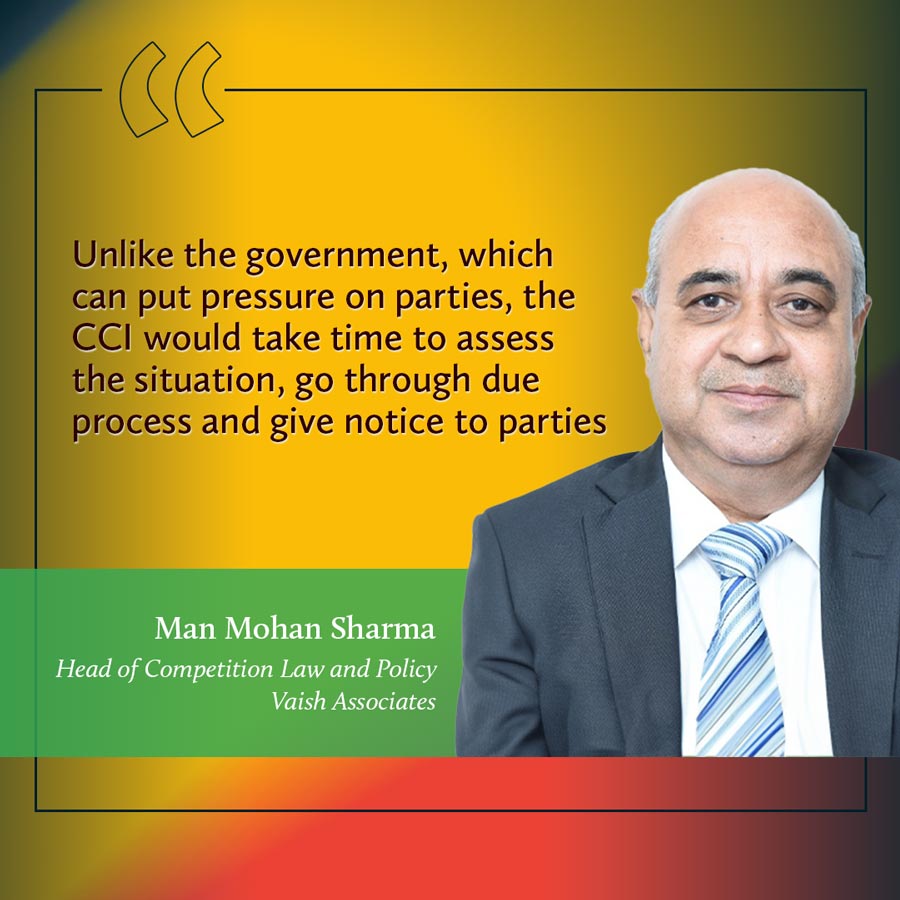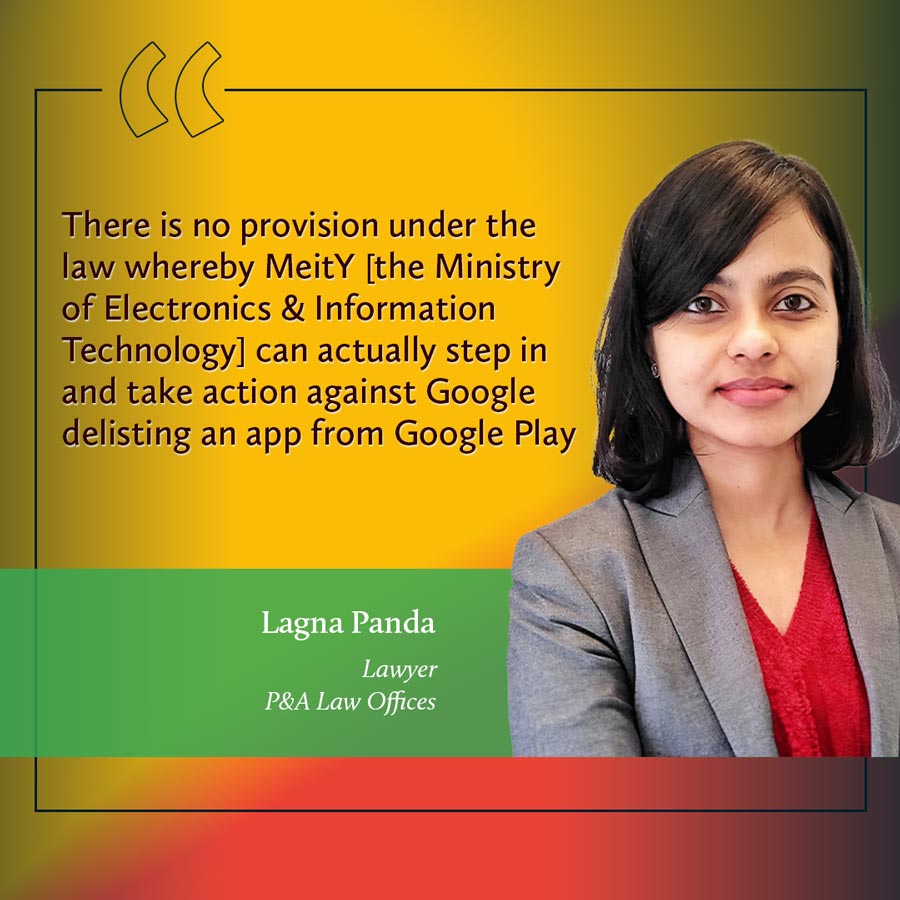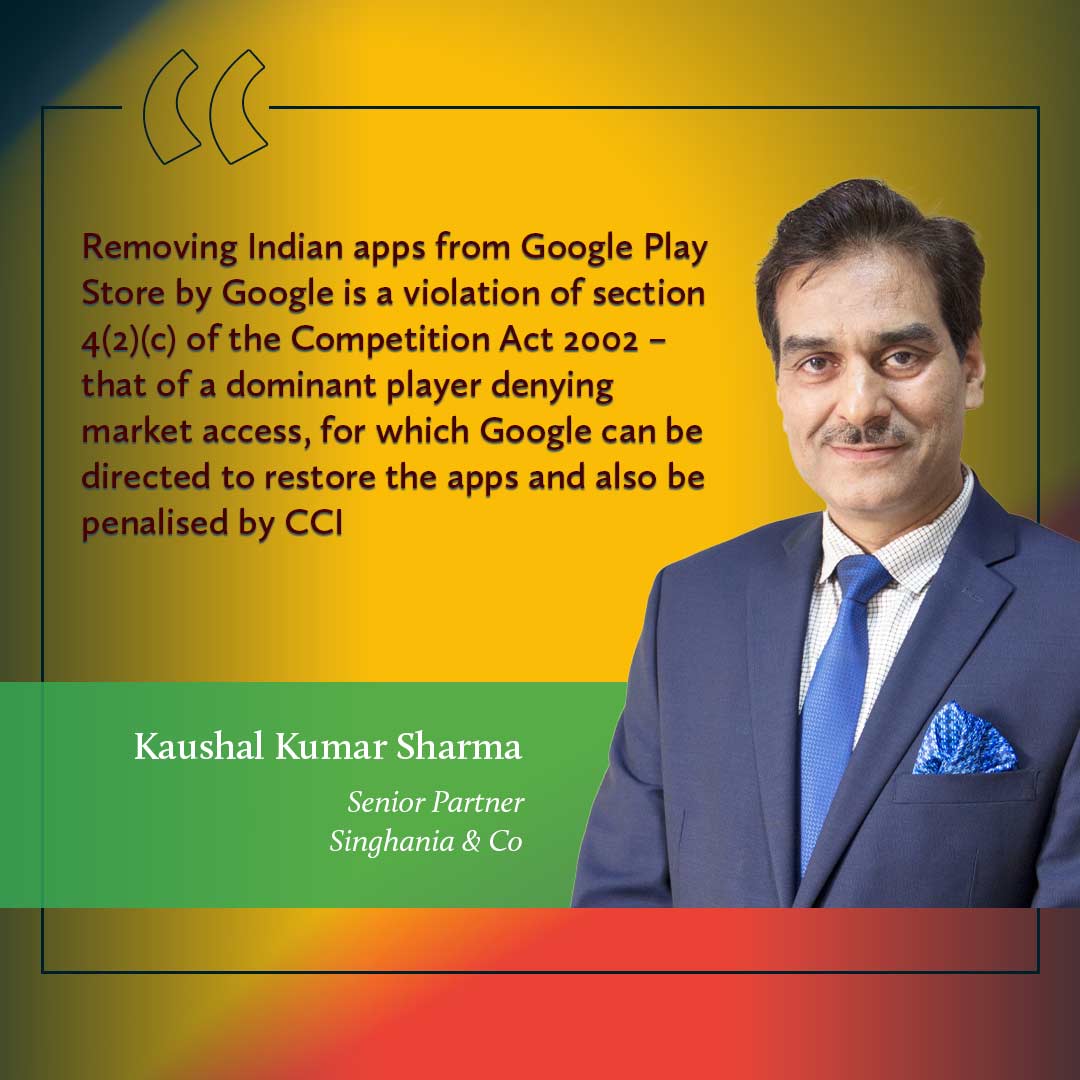A decision by a US tech giant to delist Indian apps has sparked the ire of the government and the competition regulator. The confrontation positions the authorities as safeguarding domestic players and preventing abuse of market dominance, writes Freny Patel.
The Indian government’s intervention in early March to stop Google delisting some of the leading domestic apps from its marketplace came as the country’s antitrust watchdog remained indecisive.
The government said it was stepping in to prevent Google from removing several top domestic apps to safeguard domestic startups and promote a more competitive tech industry.
About 200 Indian apps had been delisted from the Play Store. Minister for Railways, Communications and Electronics & Information Technology, Ashwini Vaishnaw, lashed out, stating, “This delisting cannot be permitted.”
Sending out a strong message that India will not tolerate any actions taken by Big Tech that could jeopardise the growth and success of its startup ecosystem, Vaishnaw said that the fate of the startup ecosystem, a key part of the Indian economy, “cannot be left to the policies of any Big Tech”.
The government’s intervention in the Google Play Store case was most likely triggered by its desire to propel the growth of India’s local startups, given that Google has 95% market share in the licensable mobile operating system market. This makes the Google Play Store a “must-have” for smartphone users and “indispensable” for app developers, says Lagna Panda, a New Delhi-based lawyer with P&A Law Offices.
“The government wants to showcase India as the new tech economy, especially now that China is not doing very well in the tech space,” says Panda.
Fast forward to the Ides of March, and the Competition Commission of India (CCI), waking up from its slumber, ordered an investigation into Google’s “excessive” and “unfair” in-app pricing policy – a policy the watchdog said failed to have any reasonable economic relation to the services provided.
The CCI’s investigation of Google Play’s alleged excessive pricing was triggered by three complaints filed by: People Interactive India, which operates Shaadi.com and Sangam.com; Mebigo Labs, the owner of Kuku FM; and the Indian Broadcasting & Digital Foundation, together with the Indian Digital Media Industry Foundation.
“Unlike the government, which can put pressure on parties, the CCI would take time to assess the situation, go through due process and give notice to parties,” says Man Mohan Sharma, the head of competition law and policy at Vaish Associates in New Delhi. Sharma formerly served at the CCI as an additional registrar, and was responsible for drafting the Implementing Regulations under the Competition Act, 2002.
As this would have taken time, “it was imperative for the government to step in to ensure against the closure of businesses”, he says.
The government’s intervention and action taken by the CCI have no comparison, says Kaushal Kumar Sharma, the first director general and head of the merger control and antitrust divisions at the CCI, and currently a senior partner at Singhania & Co in New Delhi.
“It’s like comparing apples with oranges. The CCI is a creation of the statute having its independence. Nonetheless, a statute is always a creation of the parliament, and the parliament, through its executive arm, the government, has the statute-making power. Therefore, government intervention and action by the CCI cannot and should not be compared,” says KK Sharma.
It was critical for the CCI to investigate the Google dispute with app developers at this juncture. Anisha Chand, a Mumbai-based partner in the corporate and commercial practice group at Khaitan & Co, says: “While the government’s stance has been taken under public policy, it is not clear under which legislation it would fall.”
Panda agrees and says: “There is no provision under the law whereby MeitY [the Ministry of Electronics & Information Technology] can actually step in and take action against Google delisting an app from Google Play.”
Although the CCI has taken action on Google’s allegedly unfair service fee policy, the delisting of apps is not specifically discussed in the CCI’s publicly available order.
“Removing Indian apps from Google Play Store by Google is a violation of section 4(2)(c) of the Competition Act, 2002 – that of a dominant player denying market access, for which Google can be directed to restore the apps and also be penalised by the CCI,” says MM Sharma.
The CCI can grant interim relief to reinstate the apps under section 33 of the Competition Act, 2002. Chand says doing so “falls under a judicial order, as opposed to the government’s executive guidance or directive”. This is important because the government’s direction needs teeth, she adds.
Although the CCI can pass interim orders under section 33 of the act and stay the levying of commission rates, MM Sharma points out: “this will require a lot of courage”.
Should the CCI pass such interim directions before the conclusion of the entire inquiry, neither the government nor the courts will have any role, he says.
Meanwhile, app developers have received some respite despite the prolonged nature of the CCI’s investigation process, says Panda, describing the government stepping in as “a case of putting the cart before the horse”.
The antitrust watchdog clubbed the three complaints, saying that Google’s updated payment policies on its Play Store violated the Competition Act, 2002, as the US tech giant abused its dominant position.
The four-year old tussle between the US tech giant and Indian app developers is a fallout of the directives issued by the CCI in an October 2022 order, Google updated its Android and Play Store policy in January 2023, and introduced third-party billing options.
Google charges a service fee ranging from 10% to 30% for its billing payment system, and a service fee between 6% to 26% for an alternative payment system.
The dispute between Google and app developers centres around fair competition, revenue sharing, and control over app distribution channels. “Google’s monetisation model is the heart of the entire billing system controversy,” says Chand.
In the October 2022 order, the CCI declined to provide specific findings regarding Google’s monetisation model “at this stage”, for want of sufficient information.
The watchdog, however, directed Google to ensure that any conditions imposed on business users are fair, reasonable and non-discriminatory.
In its recent order of 15 March, however, the CCI has found that Google’s service fee policy was unfair and discriminatory, following complaints filed by app developers who alleged that Google failed to comply with the October 2022 directions.
The CCI dismissed Google’s allegations that the antitrust watchdog is not a price regulator and should hence show restraint over claims related to service charges.
While acknowledging that the long-term solution would be to ensure a competitive marketplace, the CCI said in its March order: “In the short term the intervention by the antitrust regulators to prevent unfair pricing assumes importance in critical internet-based economic activities. The price being charged by Google appears to be unfair”, given app developers’ complete reliance on the Google Play Store.
KK Sharma says that the CCI would exceed its brief if it were to start specifying the rates of any services. However, the watchdog can look at the rates and find fault with them if its analysis finds the rates to be anticompetitive, he adds.
“The CCI has full authority as the ultimate decisionmaker … to fine-tune the charges for different services by looking at their impact on competitive conduct in the market without even being a price-setting regulator,” says KK Sharma, contesting Google’s claims by citing section 4 of the Competition Act, which relates to the abuse of a dominant position by an enterprise.
The CCI will have to analyse whether any price is “unfair or discriminatory”. “Therefore, without even specifying the price, the CCI has enough remit to address the market distortions,” KK Sharma points out.
MM Sharma agrees, and says that although the CCI is not a price-setting regulator, it has to see that “the prices charged are fair and competitive and not arbitrary”. Hence Google’s service charges are subject to investigation.
He adds that if an online service provider is found to engage in unfair or discriminatory practices in violation of section 4 of the act, it may be instructed to establish fair and competitive rates based on the rates charged by similar service providers.
From Google’s perspective, it has a legal right to decide charges to be levied on app developers under the patent law. However, this is subject to the condition of “reasonableness” under section 3(5) of the act, which MM Sharma says is within the CCI’s powers.
Technically, the CCI can regulate prices and say they are too high. But to do so it will need to show the lack of a reasonable nexus between the price charged and the underlying economic value, which may be difficult.
In its 21-page order, instructing the director general to investigate the US internet giant, the CCI said: “Google is charging four to five times its cost to the app developers, which on a prima facie level appears to be disproportionate to the economic value of services being rendered to the app developers, and appears to be an abuse of dominant position by Google.”
India Business Law Journal has learned that the government has an understanding with Google not to delete any apps until the country’s elections are over, by which time the CCI is expected to have finalised its decision.
“Though the government has set the bar, the CCI is not bound by the executive direction and has the right to take a different view,” notes Chand.
Echoing Chand, Panda opines that should the CCI’s investigation result in a finding in favour of Google, “it may prove to be unsavoury for India’s local apps and startups”.
The fight by third-party app developers against Google’s allegedly one-sided policies is not limited to India. The US internet giant has faced similar challenges in South Korea, the US and the UK. Given the circumstances, it is highly improbable that app developers will find themselves in a disadvantaged position.
GOOGLE’S AI RUFFLES FEATHERS TOO
It was not only Google’s treatment of popular domestic apps that caught the government’s attention. Its artificial intelligence (AI) platform, Gemini, also stirred up controversy due to its alleged “unreliability”. The US-based company was forced to apologise for comments deemed inappropriate by the Indian government that were made by Gemini when prompted to answer a question about Prime Minister Narendra Modi. But the story didn’t end there.
The Ministry of Electronics & Information Technology (MeitY) issued an advisory to social media intermediaries and AI platforms on 1 March, instructing them to obtain a permit from the government prior to launching any AI products.
The advisory also cautioned that any under-trial or unreliable AI models must be labelled as potentially fallible in terms of the output, supposedly signalling India’s future AI regulatory framework. This was in contrast to the laissez-faire approach signalled by the government earlier with respect to AI regulations. India’s advisory brought the aspect of accountability of AI platforms into the spotlight, along with the country’s rhetoric to create “a safe and trusted internet”. Platforms and intermediaries were warned not to use India as a testing ground; otherwise, they would face consequences for non-compliance.
With the startup community raising concerns on having to seek government approval before launching any AI products, Indian Minister of State for Electronics and Information Technology, Rajeev Chandrasekhar, backed down, saying the advisory was solely for “significant platforms”, and was not applicable to startups.
In the past few years, the Indian government has come up with policies to incentivise manufacturing sectors, particularly electronics manufacturing, and the startup ecosystem.
Following further industry pushback, the ministry revised the advisory in mid-March, stating that prior government approval was not required, but that content generated using AI software or platforms needs to be labelled on the possibility of inherent fallibility.
“The revised advisory does not make any mention of a law that backs it … [which] raises questions on whether the advisory has any statutory force,” says Lagna Panda, a New Delhi-based lawyer with P&A Law Offices.
While one could argue that this advisory is a policy decision issued in exercise of powers under article 77 of the Constitution of India read with the Government of India (Allocation of Business Rules), 1961, it remains to be seen if the constitutionality of this advisory will be challenged, adds Panda.
The MeitY possibly felt the need from a political point of view to step in to resolve the issues, considering the upcoming general elections and from the perspective of boosting the growth of India’s local tech ecosystem.
































